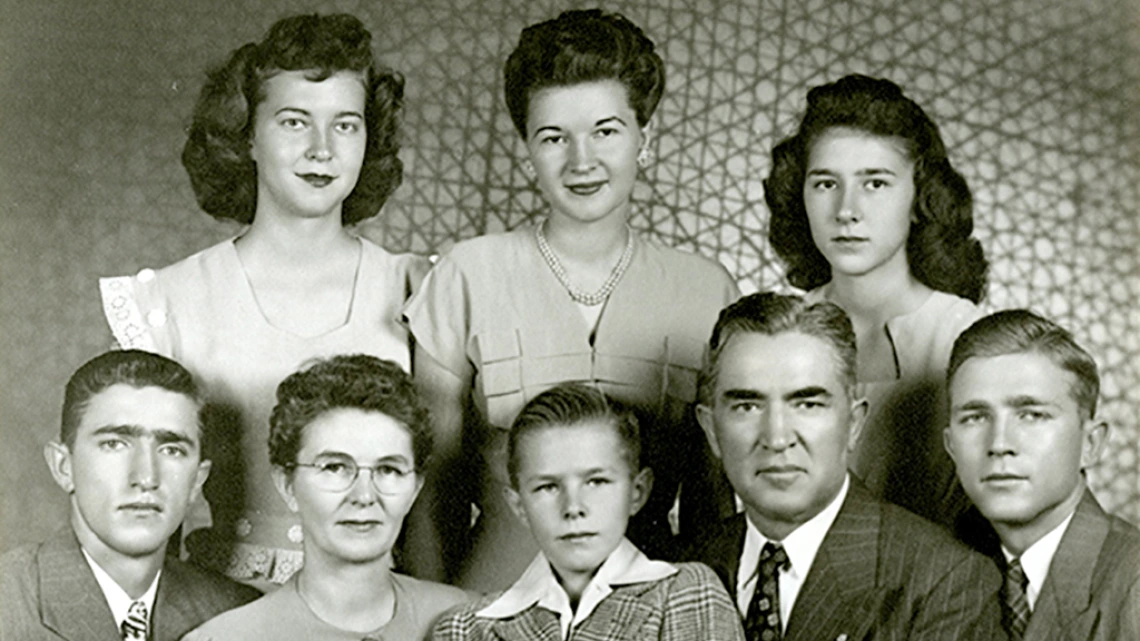Jesse A. Udall papers

Lela Lee, Jessica, Mary Louise, Kenyon, Lela, David, Jesse and Addison Udall, taken by Le Portraits in Salt Lake City, Utah
Collection area: Political Affairs
Collection dates: circa 1882-1981 bulk (bulk 1935-1978)
This collection is organized into two series: Personal and Family Papers; and Professional Papers. The Personal and Family Papers series includes biographical summaries; clippings documenting honors and personal and family achievements; a few miscellaneous church related items; retirement records and correspondence; certificates and awards from various civic organizations; and correspondence and clippings pertaining to son Addison Udall's World War II experiences.
The Professional Papers series relates to his military and legal careers, and contains primarily correspondence, clippings, and speeches. Other miscellaneous documents include military orders, certificates, Arizona election results from 1960 to 1970, a list of opinions authored by Jesse Udall, and documents pertaining to the operation of the Arizona National Guard Unit in Safford between 1930 and 1940.
Most of the material in this series covers either the span of Udall's National Guard and subsequent Army involvement, 1930 to 1945, or his tenure on the Arizona State Supreme Court, 1960 to 1972. There is little relating to his legal career prior to 1960. Other events falling within the scope of this subgroup are his service on the Arizona Interstate Stream Commission and a post-retirement effort to persuade some U. S. Congressmen of the merits of purchasing a corridor through Mexico from Arizona to the Gulf of California. This collection contains none of the correspondence or papers generated by Udall in his capacity as lawyer or judge.
Jesse Udall was born on June 24, 1893 in Eagar, Arizona, one of six children of Mormon settlers David King Udall and Ida Hunt. He attended elementary and high schools in St. Johns, Hunt, and Snowflake, Arizona, and graduated in 1914 from Gila Academy (now Eastern Arizona Junior College) in Thatcher, Arizona. In 1917 he wed Lela Lee (1895-1976). They had six children.
Following service as an Army ambulance driver in France during World War I, Udall graduated from the University of Arizona Law School in 1924, and established a private practice in Safford. A Republican, he was elected County Attorney for Graham County, a position he held in 1925 and 1926. Returning to private practice, he served as a state legislator from Graham County from 1931 to 1935. He was elected Graham County Superior Court Judge in November 1938.
In 1926 and 1927, Udall helped organize a National Guard unit, 158th Infantry Company G, in Safford. He became captain of the unit in 1928, and five years later was promoted to major in the Judge Advocate Department. As Lieutenant Colonel in 1942 he was called to active duty in Washington, D. C., where he served as Chief of the Review Section of the Internal Security Division, and later as a member of the Industrial Employment Review Board. Returning to Safford in 1945, Udall resumed his private law practice. He was a member of the Arizona Interstate Stream Commission from 1948 to 1953, and was appointed Graham County Superior Court Judge from 1953 to 1958. He served the Church of Jesus Christ of Latter-Day Saints in the presidency of it's Southern California Mission from 1958 to 1960. He resigned that position when he was appointed to fill the Arizona Supreme Court seat vacated by the death of Levi Udall. He was elected to that seat in 1960, 1964 and 1970, and retired in 1972 due to the poor health of his wife Lela. He served as Chief Justice in 1964 and 1969.
Udall married Lillian Cliff Jenkins in 1977. Throughout his life he was active in the Mormon Church, serving as bishop of Thatcher Ward, president of St. Joseph Stake, and patriarch of Tempe Stake. He was also active in a number of service organizations, including the Boy Scouts and Rotary Club. He died of heart failure on May 11, 1980.
A collection guide explains what's in a collection. New to using our collections? Learn how to use a collection guide.
Collection guideAccess this collection
Visit us in person to access materials from this collection. Our materials are one-of-a-kind and require special care, so they can’t be checked out or taken home.
How to cite
Learn how to cite and use materials from Special Collections in your research.
